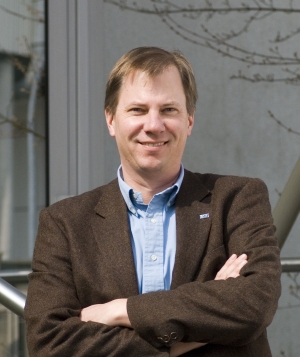For the first time during the 40 years of its existence, the renowned Materials Research Society (MRS) has elected a non-American as its president: The KIT materials researcher Professor Oliver Kraft will be Vice President of the MRS in 2014 and MRS President in 2015. At KIT, Oliver Kraft is Director of the Institute for Applied Materials (IAM) and holds the Robert Bosch Professorship for Nanostructured Functional Materials.
“The Materials Research Society has its office in the USA and is a globally operating society with members in 80 countries,” Professor Kraft explains. “It will be one of my major goals as MRS President to increasingly integrate members from other countries, in particular from threshold countries, for cooperation. In this way, materials sciences can be shaped worldwide and in an interdisciplinary manner in line with our principle ‘Improving the quality of life’.” The MRS has more than 16400 members, who are materials researchers working in research, industry, and the public sector. They are physicists, chemists, biologists, mathematicians, and engineers and, thus, cover the complete spectrum of materials sciences. The MRS supports interdisciplinary exchange and is one of the leading organizations for materials research worldwide.
Research conducted by Professor Oliver Kraft at KIT focuses on nanomaterials for various applications, ranging from microsystems technology and microelectronics to energy conversion and energy storage. With his about 70 employees at IAM, he develops and characterizes materials and studies their mechanical behavior, function, stability, and long-term reliability. He combines experiments with models and simulations from the atomic to the macroscopic scale.
Oliver Kraft studied and did his PhD in materials sciences at the University of Stuttgart. He was guest scientist at the Department of Materials Science and Engineering of Stanford University/USA and headed a project group in the area of “Deformation Mechanisms in Thin Metal Layers and Small Volumes” at the Max Planck Institute for Metals Research, Stuttgart. Since 2002, he has been professor and head of institute at KIT. In early 2012, he was appointed Robert Bosch endowed Professor for Nanostructured Functional Materials.
In close partnership with society, KIT develops solutions for urgent challenges – from climate change, energy transition and sustainable use of natural resources to artificial intelligence, sovereignty and an aging population. As The University in the Helmholtz Association, KIT unites scientific excellence from insight to application-driven research under one roof – and is thus in a unique position to drive this transformation. As a University of Excellence, KIT offers its more than 10,000 employees and 22,800 students outstanding opportunities to shape a sustainable and resilient future. KIT – Science for Impact.

